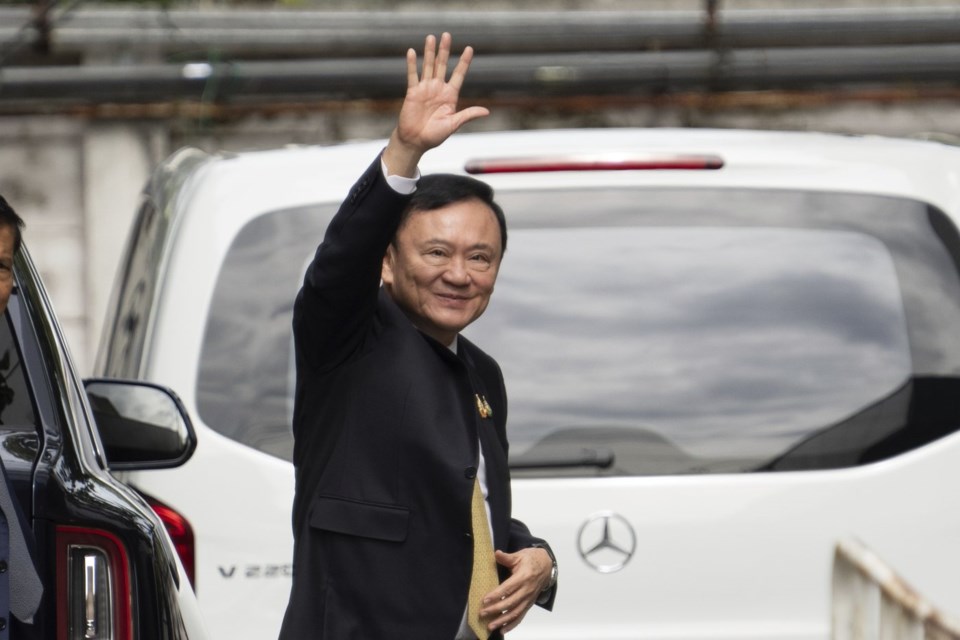BANGKOK (AP) — Former Thai Prime Minister Thaksin Shinawatra said he was acquitted of royal defamation by a court on Friday, in a case that could have sent him to prison for up to 15 years.
The 76-year-old Thaksin, smiling as he walked away from the courtroom, responded to journalists' questions with the single word: “Dismissal.”
His lawyer, Winyat Chatmontree, also confirmed the acquittal verdict, but the Bangkok Criminal Court did not immediately issue a statement.
The law on defaming the monarchy, an offense known as lese majeste, is punishable by three to 15 years in prison. It is among the harshest such laws globally and increasingly has been used in Thailand to punish government critics.
The legal aid group Thai Lawyers for Human Rights has said that since early 2020, more than 270 people — many of them student activists — have been charged with violating the law.
Winyat told reporters that the court dismissed the case against Thaksin on several grounds. He said the court found the witnesses and evidence were too weak to support conviction.
Thaksin was originally charged in 2016 over remarks he made a year earlier to journalists in South Korea. The case was not pursued at that time because he was in exile and the necessary legal procedures could not be completed.
Winyat said the court determined that the account of the interview presented by the prosecution was incomplete and lacked context, and a key point did not clearly refer to the monarchy.
Winyat also said the court thought the complaint against Thaksin might have been motivated by political bias, causing his words to be unfairly interpreted.
Thaksin’s opponents, who were generally staunch royalists, accused him of corruption, abuse of power and disrespecting then-King Bhumibol Adulyadej, who died in 2016. Thaksin has always asserted that the cases against him were politically motivated.
When he was indicted last year, Thaksin’s freedom on bail was approved with the condition that he could not travel out of Thailand unless approved by court. His passport was confiscated.
Despite facing various prosecutions since leaving office, Thaksin has spent no time in prison. He was abroad in 2006 when a military coup ousted him. He briefly returned in 2008, only to return quickly to exile to avoid a possible prison term.
He returned to Thailand in 2023 when the Pheu Thai political party that he is closely associated with came to power. He was sent to serve an eight-year prison term on charges related to corruption and abuse of power but was transferred immediately to a hospital on medical grounds. After six months in a hospital suite, he was granted a pardon and parole and set free.
The decision to send him to a hospital instead of prison was widely questioned as to whether he was granted a special, undeserved privilege. The Supreme Court’s Criminal Division for Political Office Holders will rule next month in another case that puts him in jeopardy of imprisonment.
Since his return, Thaksin has maintained a high profile, traveling the country making public appearances and political observations that could upset the powerful conservative establishment that was behind his 2006 ouster.
His daughter, Paetongtarn Shinawatra, who became prime minister last year, is also in hot water. She stands accused of failing to handle in an ethical manner a June 15 call with Cambodian Senate President Hun Sen in which they discussed tensions over territory claimed by both nations. The Constitutional Court suspended her from her duties on July 1 and next week will rule whether she will lose her prime minister position for breaching ethics laws.
Thais have long been accustomed to sudden changes of government due to military coups, numbering more than a dozen since the 1930s. But in the past two decades, they have increasingly seen such changes imposed by the courts, which have ousted four prime ministers and dissolved three election-winning political parties, often on narrow technical grounds.
In most cases, the targets were viewed as challengers to the traditional royalist establishment, whose most powerful defenders are the army and the courts.
Chalida Ekvitthayavechnukul And Grant Peck, The Associated Press



